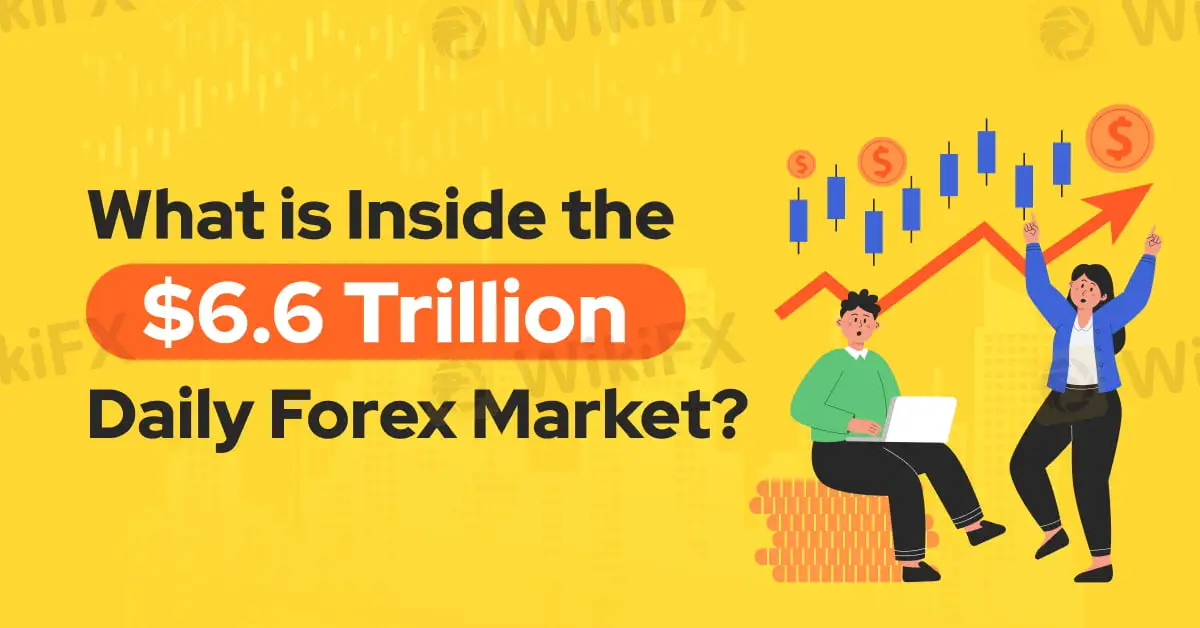简体中文
繁體中文
English
Pусский
日本語
ภาษาไทย
Tiếng Việt
Bahasa Indonesia
Español
हिन्दी
Filippiiniläinen
Français
Deutsch
Português
Türkçe
한국어
العربية
What is Inside the $6.6 Trillion Daily Forex Market?
Abstract:This article explores the vast influence of the $6.6 trillion foreign exchange market, its role in global trade, the impact of the floating exchange rate system, and the key players shaping currency values.

The foreign exchange (forex) market stands as one of the most influential and dynamic financial markets in the world. With a staggering daily trading volume of approximately $6.6 trillion, the forex market dwarfs the combined trading volumes of major global stock exchanges. This immense market size reflects the critical role forex plays in global economics, where currency exchange is integral to international trade, investment, and economic policy.
The growth of global trade, driven by the principle of comparative advantage, has necessitated the development of a robust and fluid foreign exchange market. Comparative advantage enables countries to specialize in the production of goods they can produce most efficiently, leading to a thriving international trade network. As goods and services flow across borders, so too does the need for currency exchange, reinforcing the importance of the forex market in the global economy.

The evolution of the forex market can be traced back to the collapse of the Bretton Woods system in the 1970s. Under Bretton Woods, currencies were pegged to the US dollar, which in turn was tied to gold. The system's collapse led to the adoption of floating exchange rates, where currencies are traded freely on the open market, much like commodities. This shift significantly increased the influence and volatility of the forex market, as currencies began to fluctuate based on supply and demand dynamics.
Key players in the forex market include businesses, investors, and governments, each with distinct motivations and strategies. Businesses engage in forex trading to support their international operations, such as opening new stores abroad or paying suppliers in different currencies. Investors, on the other hand, use forex to hedge against currency risks or to speculate on exchange rate movements, often employing financial instruments like derivatives to maximize profits. Governments also play a crucial role in the forex market, often manipulating their currencies to achieve economic objectives. For instance, China has been known to devalue its currency to make its exports more competitive on the global stage.
Despite the forex market's importance, the intrinsic value of currencies remains a complex and often debated topic. Unlike tangible goods, currencies, shares, and derivatives lack intrinsic value; their worth is determined by market perception and what others are willing to exchange for them. This concept is exemplified by the British Pound, which remains one of the most valuable currencies globally, largely due to historical factors rather than solid economic foundations.
In essence, the forex market's vast scale, influence, and complexity underscore its pivotal role in the global economy. It facilitates international trade, supports investment strategies, and allows governments to pursue economic policies, all while operating in a landscape where the value of currencies is determined by perception rather than intrinsic worth.

Disclaimer:
The views in this article only represent the author's personal views, and do not constitute investment advice on this platform. This platform does not guarantee the accuracy, completeness and timeliness of the information in the article, and will not be liable for any loss caused by the use of or reliance on the information in the article.
Read more

Italian Regulator Warns Against 5 Websites
The Italian regulator, CONSOB has issued a warning against five websites offering unauthorized financial services. This regulatory action aims to protect the public from fraudulent activities.

Trader Exposes Unethical Practices by STP Trading
A recent allegation against STP Trading has cast doubt on the firm's business practices, highlighting the potential risks faced by retail traders in an increasingly crowded and competitive market.

What Makes Cross-Border Payments Easier Than Ever?
Cross-border payments are now faster, cheaper, and simpler! Explore fintech, blockchain, and smart solutions to overcome costs, delays, and global payment hurdles.

FCA Identifies Clone Firm Exploiting Admiral Markets' Credibility
The UK Financial Conduct Authority (FCA) has issued a public warning regarding a fraudulent entity impersonating Admiral Markets, a legitimate and authorised trading firm. The clone firm, operating under the name Admiral EU Brokers and the domain Admiraleubrokerz.com, has been falsely presenting itself as an FCA-authorised business.
WikiFX Broker
Latest News
Hackers Charged for $11M Crypto Theft Using SIM-Swaps
Role of Central Banks in the FX Market
FCA Alerts Against Sydney FX
What Makes Cross-Border Payments Easier Than Ever?
Trader Exposes Unethical Practices by STP Trading
Malaysian Man Loses RM113,000 in Foreign Currency Investment Scam
Bitcoin Nears $100,000: A Triumph of Optimism or a Warning Sign?
Mastercard Partners with JPMorgan for B2B Cross-Border Payments
FCA Identifies Clone Firm Exploiting Admiral Markets' Credibility
Coinbase Under Scrutiny Amid Wrapped Bitcoin Delisting Controversy
Currency Calculator


